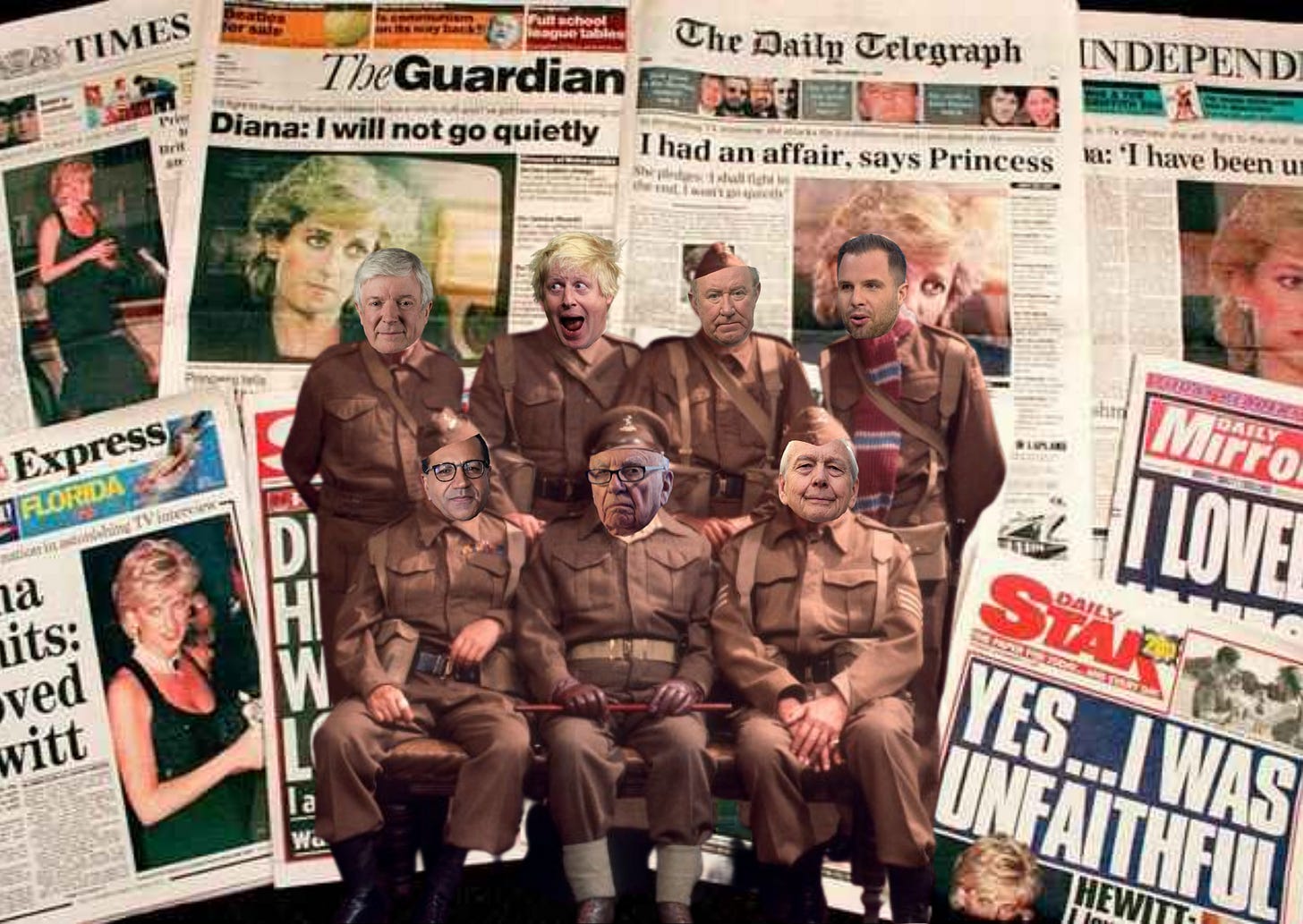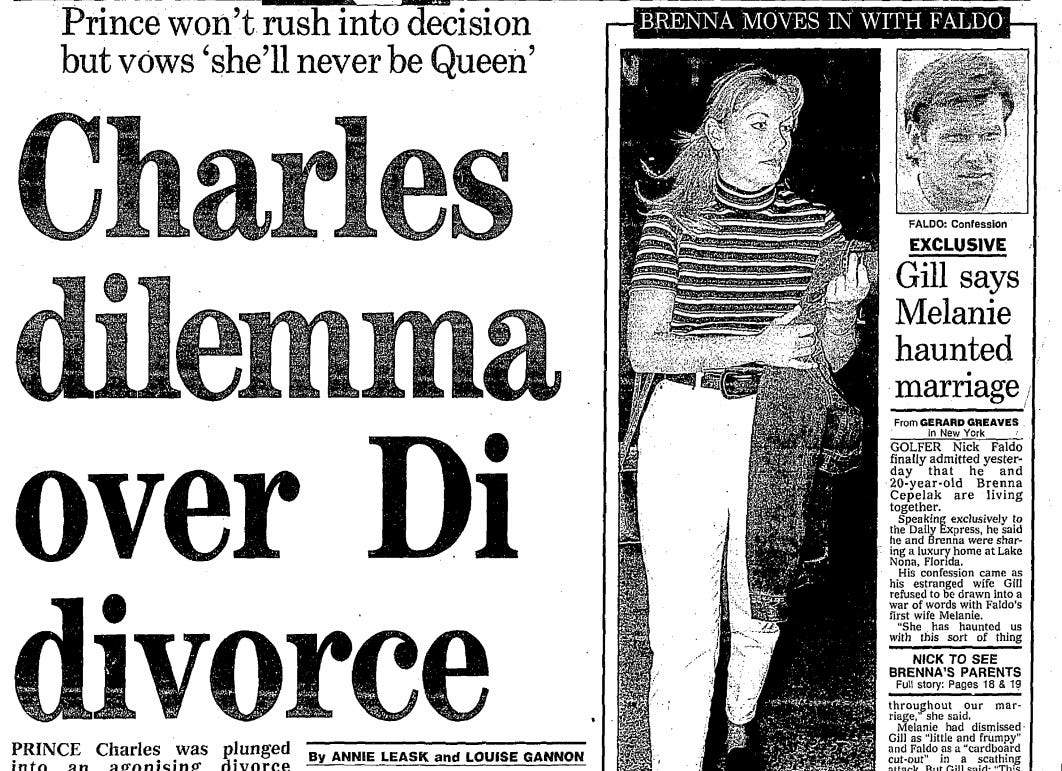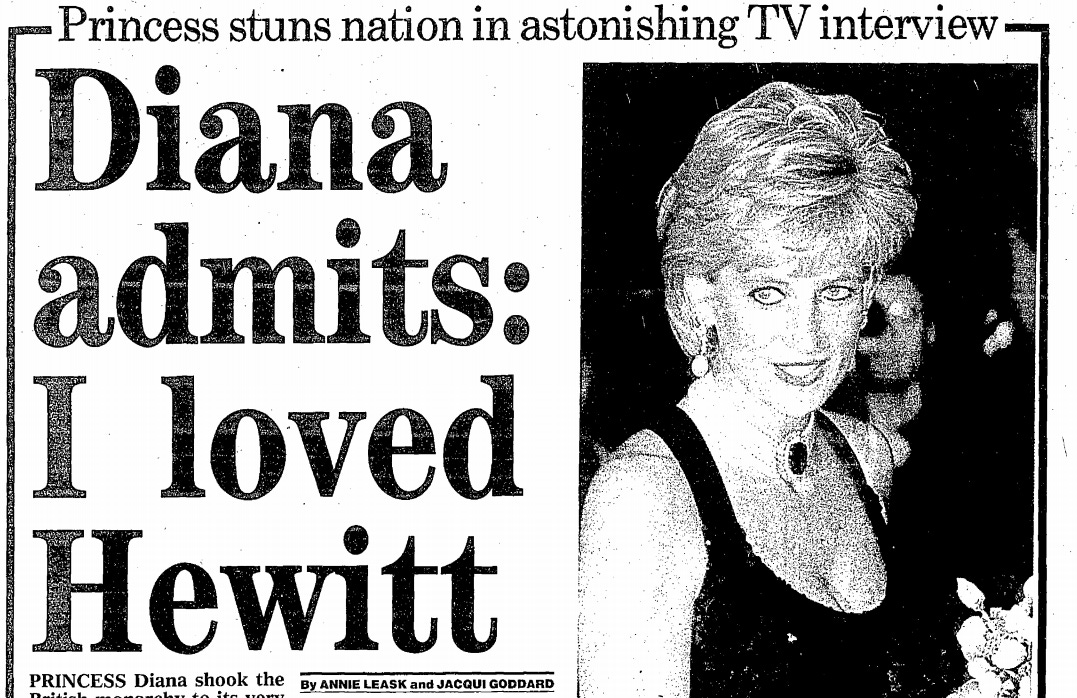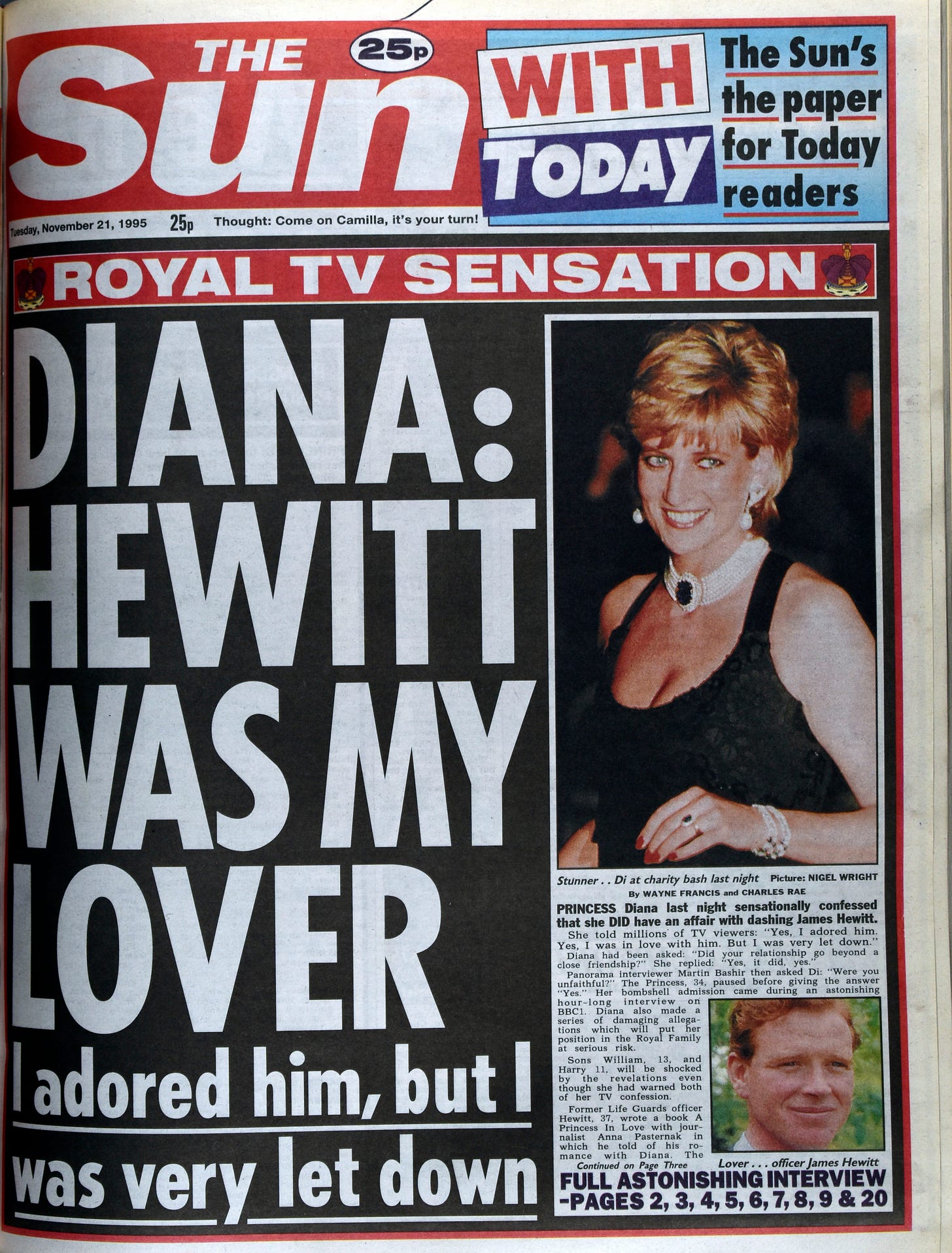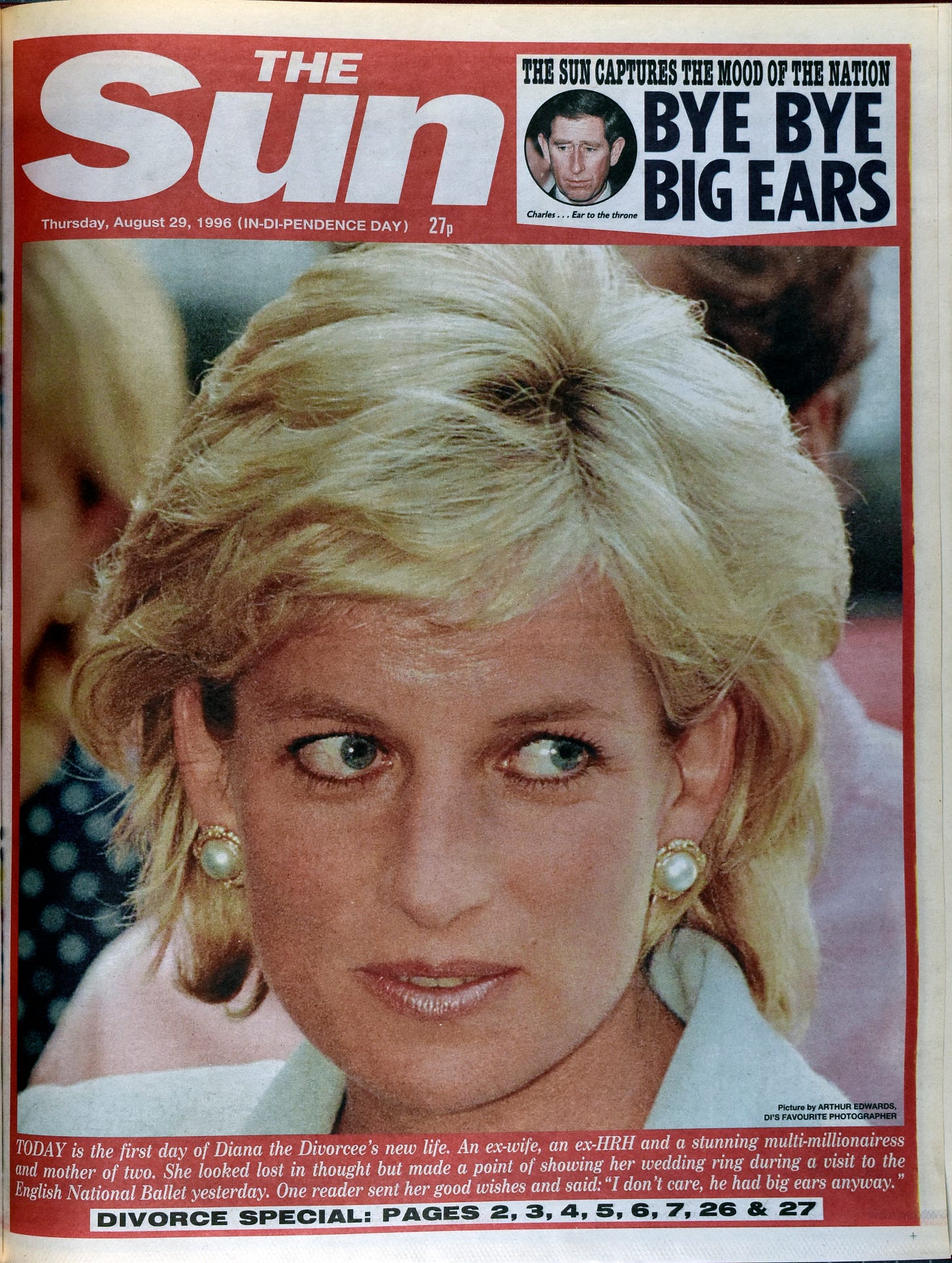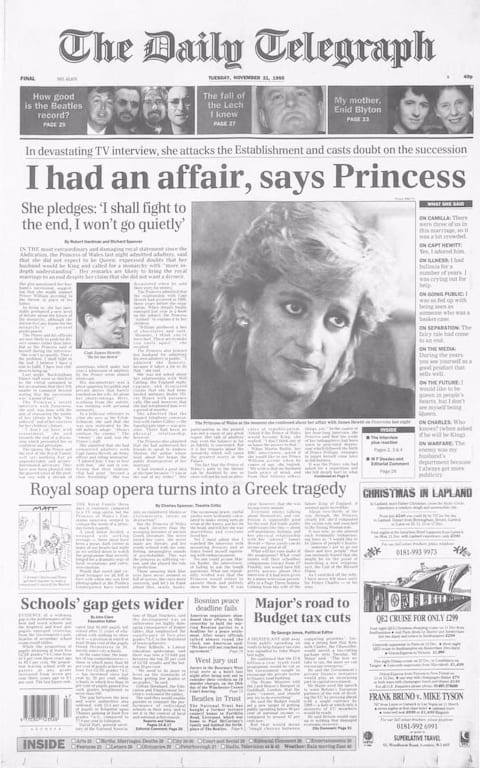The Phoneys War: The British media's worst bastards bash the BBC... and ignore 25 years of their own bullshit
Let's see what the bastards that make up the British political and media establishment were doing 25 years ago...
We’re going to play a game in today’s edition called… Where Were They 25 Years Ago (And What Were They Up To)? It’s to celebrate rampant political and media hypocrisy in the light of the Dyson Inquiry into how Martin Bashir secured his infamous Diana interview.
Twenty-five years ago I was 12 so aside from the tabloid I printed in my garage and distributed to an audience of troll dolls, I’m largely in the clear.1
Let’s start with Boris Johnson, a 56-year-old man shown in the video above wearing a jacket emblazoned with his job title as if even he can’t quite believe it’s actually true, who says of the Bashir findings:
I'm obviously concerned by the findings of Lord Dyson's report - I'm very grateful to him for what he has done. I can only imagine the feelings of the royal family and I hope very much that the BBC will be taking every possible step to make sure nothing like this ever happens again.
What was Boris Johnson doing 25 years ago?
In June 1995, a recording of a 1990 telephone conversation between Johnson and his friend, the convicted fraudster Darius Guppy, was made public. In it, Guppy said his activities — an insurance fraud involving a faked robbery which he was found guilty of in a 1993 court case — were being investigated by a News of the World journalist called Stuart Collier.
Guppy asked Johnson to get hold of Collier’s private address and made it clear he intended to have the journalist beaten up (“… a couple of black eyes and a cracked rib or something like that.”) Johnson agreed to give the information to Guppy with his only real concern being that he might be linked with the attack.
When the phone conversation was published, Johnson claimed that while he had said he would help Guppy he actually didn’t. Max Hastings, editor of The Daily Telegraph at the time, gave Johnson a slap on the wrist but declined to fire him.
In 1998, Johnson had been fired from his first job in journalism at The Times after making up a quote from his own godfather, the historian Colin Lucas. In 2013, 25 years after that lie, Johnson — now MP for Henley — wrote for The Independent in a piece about his “greatest mistake”:
I was desperate to get hold of a historian who could help me, but the only one I knew was my godfather Colin Lucas, a very distinguished man who is now vice-chancellor of Oxford University… I rang him and he obligingly gave me some quotes about Edward II. The trouble was that somewhere in my copy I managed to attribute to Colin the view that Edward II and Piers Gaveston would have been cavorting together in the Rose Palace.
Unfortunately, some linkside don at a provincial university spotted that by the time the Rose Palace was built, Piers Gaveston would long have been murdered. It was very nasty. Colin hadn't quite said that, and now his academic reputation was on the line.
It was extremely difficult, and I had absolutely no idea what to do. I was 23, overcome with guilt and shame that this error – this howler of mine attributed to Colin – had crept on to the front page of The Times, which was holy territory for me. So I made matters worse. I wrote a further story saying that the mystery had deepened about the date of the castle.
So he lied about his lie and then, a quarter of a century after shaming himself on the front page of The Times, found a way to blame someone else — that mystery “linkside don at a provincial university” — for ruining his jolly wheeze.
The Guppy incident didn’t cause Boris Johnson any personal, professional, or political consequences. One of the greatest bullshitters of his generation, he simply continued to turn lies into profit, writing a series of increasingly lie strewn tales about the EU which Telegraph readers gobbled up.
The legend of the EU plan to ban bendy bananas and claims about it insisting on one-size-fits-all ‘eurocoffins’ and smaller condoms because of “Italian concerns” all came from Boris Johnson. 30 years after the condom story, former European Commission spokesperson, Willy Hélin, was still raging about the“load of old bullshit”. From his hospital bed, he told The Guardian:
We were not interested by sizes. We had had requests from medical institutions across Europe to check on the safety of condoms. That has nothing to do with the size of dicks. All the journalists went on about comparing the size of penises in Germany and France. It’s about safety because so many doctors were interested to know about the risks for Aids patients. He was the paramount of exaggeration and distortion and lies. He was a clown – a successful clown.
From becoming the editor of The Spectator in 1999 — a job he lied to get, lied to keep, and lied throughout — to becoming Prime Minister in 2019, Boris Johnson continued to lie as if it were as natural as breathing. He is sustained by lies. He lies so much that he himself can never truly be sure what’s real — when he lies most successfully it often seems like even he now thinks the lie is the truth.
Martin Bashir, himself an inveterate liar as proved not just the Dyson report but the many other instances of dubious conduct in his journalistic career, is 58. He is of the same generation of liars as Boris Johnson but his lying and the brazen nature of it is nothing compared to the Prime Minister’s predilections. Bashir is a mere dilettante of deception compared to Bullshitting Boris the Grand Poobah of Pernicious Prattling.
But Boris Johnson is in government. He is Prime Minister and has been rewarded handsomely for his commitment to untruths. And the BBC, once again having been revealed as an organisation where managers can lie to themselves with the consummate ease of Sir Humphry combined with the execution of Mr Bean attempting to cross a butter-covered floor, has made it easy for Johnson’s government to accelerate what it already planned to do — crippling the BBC even further in a long march towards disassembly and privatisation.


Huw Edwards — who in 1995 was working at the BBC but four years away from becoming the presenter of the Six O’Clock News — tweeted yesterday:
There is no excuse or justification for what happened in 1995. We are all sickened by it and the subsequent handling of it. For today’s @BBCNews team — 25 years on — to lectured on probity and trust by certain parts of the media is somewhat vexing. #DysonReport @BBCNewsPR
But the BBC and its journalists aren’t meant to defend themselves and Edwards deleted the tweet and said:
I’ve agreed to take down my earlier tweet because it’s encouraged more attacks on @BBCNews colleagues. That’s the last thing I want. They deserve praise for the work they do.
Of course, The Daily Express — a newspaper with an entirely unblemished history of covering Princess Diana with kindness, tact and proportionality — was quick to leap on Edwards’ tweet. It published a piece headlined Huw Edwards: BBC News host forced to delete tweet about ‘lecturing’ over Diana interview which is made up of little more than other people’s tweets about the initial tweet.
That’s the kind of hard-hitting journalism that you can expect from The Daily Express, but What was The Daily Express up to 25 years ago?
Well, it was publishing this kind of thing in the run-up to the Bashir interview…
… a front-page story bylined to Annie Leask — later the paper’s Showbiz Editor — and Shekhar Bhatia, who is still plying his trade as a senior reporter at The Daily Mail and MailOnline.
On the day of the interview, it splashed with Charles Dilemma over Di Divorce and on the day after went with Diana admits: I loved Hewitt.
Like the rest of the British tabloids, The Daily Express affected to be shocked by Bashir’s interview while indulging in a feeding frenzy over its revelations and privately griping that it hadn’t been the one to get the scoop.
Now let’s see what The Sun — a paper with so many skeletons in its closet that it makes Burke and Hare look lazy — has to say about the Bashir ‘affair’ as we are no doubt obliged to call it.
Under the headline Will anyone pay a price for the BBC’s scandalous Diana interview cover-up? odious pub bore Trevor Kavanagh writes, raising the spectre of police inquiries into phone hacking at The Sun and other papers:
The Corporation’s concocted pack of lies was surely a criminal act.
So, where are the police? Has anyone from Scotland Yard ordered a mob-handed dawn raid on Bashir’s home and the seizure of his computers and personal documents?
Will Labour leader Sir Keir Starmer demand the arrest of former director-general Tony Hall for conspiring in a fraud to save his, Bashir’s and the BBC’s necks?
After all, that’s what he did as state prosecutor in 2012, dragging dozens of innocent Sun journalists through the criminal courts for publishing true stories that saved lives.
Kavanagh, a Murdoch made man who has been with The Sun since 1978 and was its political editor from 1983 until 2006, has such a brass neck that he could sell it off for considerable scrap value.
So… What was The Sun doing 25 years ago?
Well, it was dedicating 10 pages (including the front page) to Bashir’s interview on the day after it was broadcast and calling it a “Royal TV Sensation”. The day after it boasted of an exclusive on the forthcoming royal divorce Queen Orders Divorce and promised “the full sensational story” and the following year, when the divorce was confirmed, The Sun published a ‘lavish’ “Divorce Special”:
Witness how ‘respectful’ it was to dear old Prince Charles who the paper now tells us has been terribly wounded by the BBC.
Like the other right-wing newspapers, The Sun is going big on government briefings that the BBC will now have its licence fee settlement slashed. It writes:
The BBC faces losing £3.2bn if their licence fees are cut after Martin Bashir's Panorama probe "tarnished" the broadcaster's reputation.
A senior government source said the Beeb's world-class status had been compromised, and the £159-a-year licencing fee could be cut or frozen for the next five years.
What would you say the hacking of a dead girl’s phone did to the reputation of Rupert Murdoch and News International? Because it seems to have had little effect on the amount of times he gets to visit the Prime Minister and senior government ministers — he and Rebekah Brookes had seven such meetings in a seven-week period between August and September last year alone.
Kavanagh himself is hardly a bastion of journalistic ethics either. In February 2017, when he was an IPSO board member, the press regulator ruled that a Sun column bylined to him was littered with factually inaccurate statements about allegedly false refugee claims. Then, in August 2017, Kavanagh used his Sun column to ponder what should be done about “The Muslim Problem”.
A joint complaint to IPSO was submitted by the Board of Deputies of British Jews, Tell MAMA and Faith Matters, who said:
The printing of the phrase ‘The Muslim Problem’ — particularly with capitalisation and italics for emphasis — in a national newspaper sets a dangerous precedent and harks back to the use of the phrase ‘The Jewish Problem’ in the last century.
Kavanagh left IPSO’s board in December 2017, only two years into a three-year contract, but he continues to write his weekly Sun column.
Over at The Daily Mail, John Humphrys — a man who never tires of attacking the broadcaster that paid him handsomely for years to chunter like an old man at the end of the bar in a flat-roofed pub that still smells of cigarette smoke — writes beneath the self-aggrandising headline Without serious reform, the BBC is damaged beyond repair: That's what one of its greatest journalists JOHN HUMPHRYS says of the corporation - once a byword for integrity, impartiality and incorruptibility but whose reputation now lies in the gutter:
The BBC may be damaged beyond repair — all in the space of 48 hours.
A great week for journalism? Yes. And that’s because, quite simply, we know a great many things today that we did not know a few days ago.
Yesterday there was not a paper in the land that did not lead with the story of the Dyson report — something that would never have been published had it not been for good journalists doing their job.
People like the Mail’s Richard Kay, Sam Greenhill, Paul Revoir and Rebecca English, and the Mail on Sunday’s Nick Fielding and Jason Lewis.
Humphrys is a company man, it’s just that the company to which he now has most loyalty is The Daily Mail. So it’s his colleagues there that get garlanded despite the fact that the grubby Richard Kay was in the Diana gossip business for far longer than Martin Bashir ever was. Here’s what Kay wrote after Princess Diana’s death in 1997:
She knew that whatever I said and whatever I might write it would always be what I thought, and sometimes, necessarily, it would be critical. So she trusted me and revealed herself constantly…
What was Richard Kay doing 25 years ago? The same as he is now: Writing about Princess Diana. He’s written millions of words on Princess Diana, the bulk of them after her death, assuring readers that he, like many other tabloid prognosticators, knows how Princess Diana would feel about everything.
Yet we’re meant to be convinced that Kay’s dogged pursuit of Bashir was purely inspired by his commitment to journalistic ethics and had absolutely nothing to do with a lingering anger at the loss of a scoop he desperately wanted.
Elsewhere in The Daily Mail, Dan Wootton, soon-to-be star of GB News — who was still New Zealand’s most obnoxious teenager 25 years ago — demonstrates his usual surfeit of class and writes, under the hysterical headline The question William and Harry must be asking; does the BBC have their mother's blood on its hands?:
Did the BBC kill Princess Diana? Not directly, no.
But if you are Prince William or Prince Harry today reading Lord Dyson's devastating report into how Martin Bashir used deceit and lies to procure his famous interview with their late mother, you would be forgiven for asking that question.
…. to plant in Diana's mind a series of clearly outlandish stories to play into her paranoia was dark and dodgy. Bashir tried everything, from the fact Diana was being bugged and her loyal staff being paid by newspapers to outlandish claims Prince Edward had AIDS and the Queen was suffering from a heart condition due to overeating.
If a tabloid newspaper had done the same thing, BBC News would have been howling for it to be shut down. And they would not have been wrong.
Wootton, a former showbiz editor of the News of the World — where phone hacking was widespread but which he denied all knowledge of at the Leveson Inquiry — should know all about “dark and dodgy” insinuations.
See more here — Wootton you know it: GB News' first 'star' hire is the worst person in UK journalism
Finally, over at The Daily Telegraph, Charles Moore — who is never happier than when he is blustering about the BBC2, writes:
In its self-righteousness, the BBC cannot see that it often behaves like a liberal version of Steve Bannon, with the added advantage of a compulsory licence fee.
What was Charles Moore doing 25 years ago?
He’d just become editor of The Daily Telegraph, a paper which he went on to edit for 8 years and to which he still clings like a tick on the arse of British public discourse. Moore’s Telegraph splashed on Bashir’s Diana interview back in 1995 and it would have gladly taken the scoop for all its tweedy pretence even then.


There have been a lot of ‘rogue’ reporters in the British media, but hypocrisy is the coin of the realm and its value just keeps rising.
That didn’t happen but I was suspended from school when I was 13 for producing a samizdat scandal sheet. When I came back to school my form teacher told me he thought it was funny. Oddly, the headteacher didn’t agree.
In 2003 he launched a column called Beebwatch.



